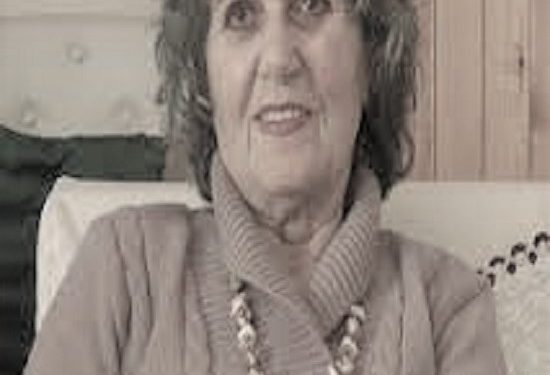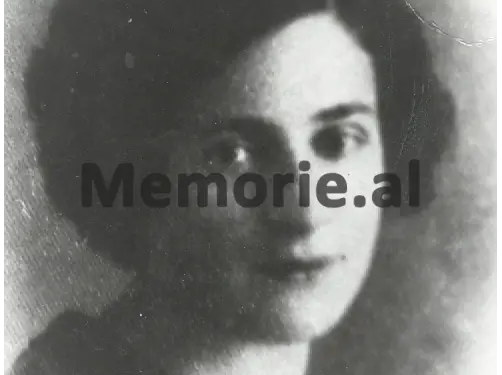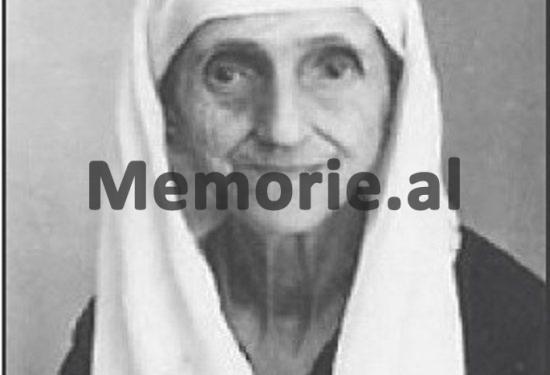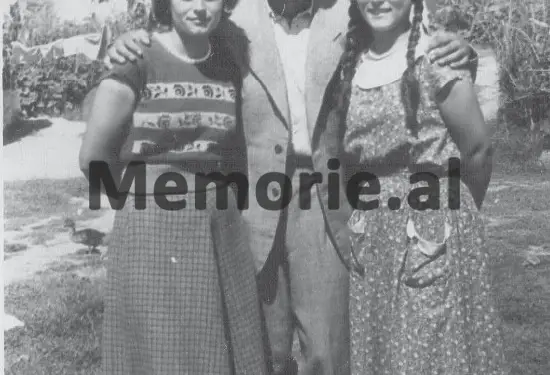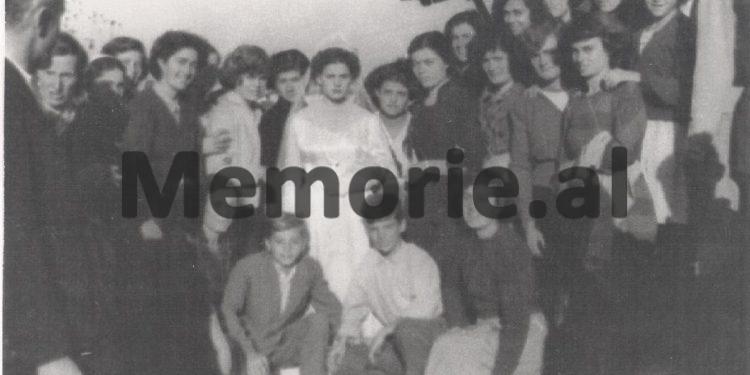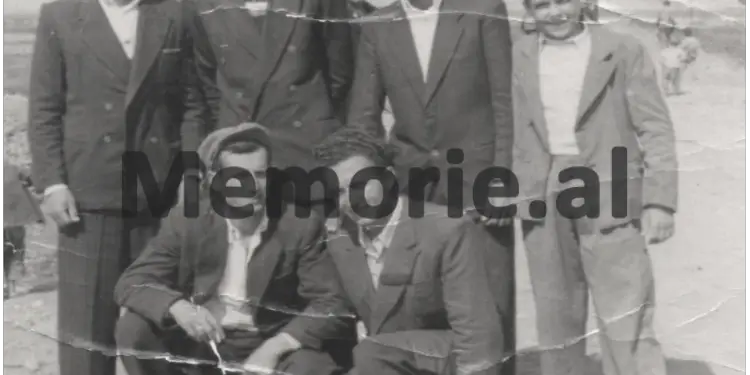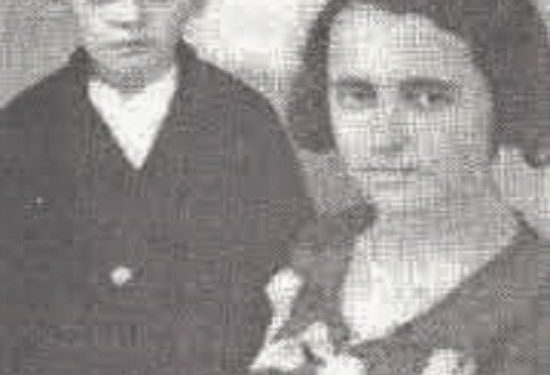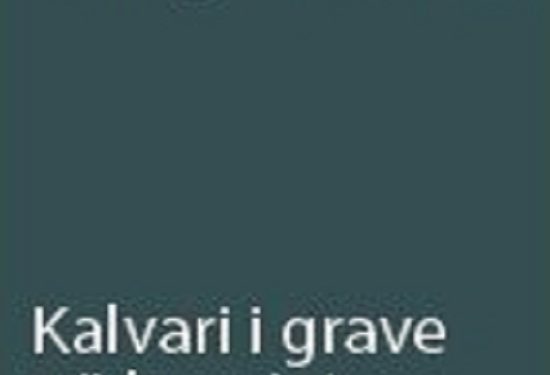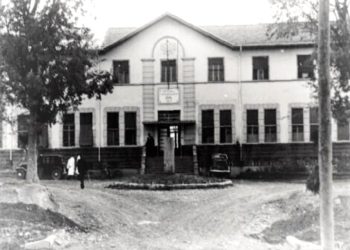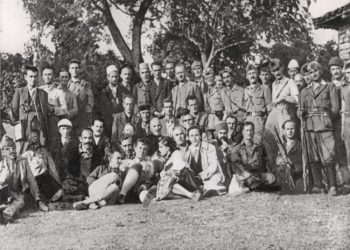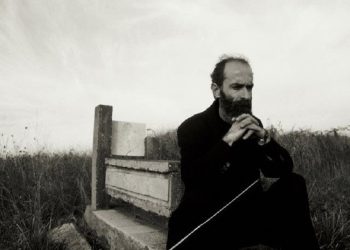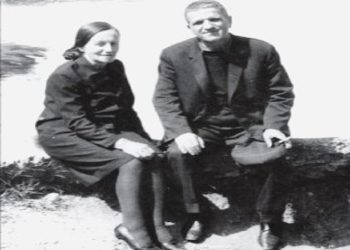Fatbardha Mulleti (Saraçi)
Part one
Memorie.al publishes some parts from the book ‘Calvary of women in communist prisons’ by Fatbardha Mulleti Saraçi, (granddaughter of the famous former mayor of Tirana, Qazim Mulleti), whose family from 1944 until In 1991, he was persecuted by the communist regime of Enver Hoxha, where Fatbardha’s father, Haki Mulleti, a former senior state administration official from the 1920s, was imprisoned and interned by his family, until died in the hospital of Tirana, poisoned by the State Security. In her book “The Calvary of Women in Communist Prisons”, which comes from several years of work, the author has masterfully described the unknown stories of some of the Albanian women and girls who suffered in prisons and internments in the dictatorial regime of Enver Hoxha, starting from her mother, Pertefe Mulleti, Marie Deda, Hajrie Kazazi, Kushe Seknej, Mrike Pali, Zyliha Rusi, Roza Jakova, Fatime Dilaveri, Hatixhe Pipa, Marije Gjoka, Angjelina Topalli, Hatixhe Kopliku, Nafije Kopliku, Vebi Bushati, Adile Kazazi, Antonela Dostanishta, Nafije Stërmasi, Luçije Saraçi, Adile Meta, Qeuthere Meta, Feride Damnori, Vitore Ashta, Fetije Vuçiterni, Zehnije Gjylbegu, Xhyhere Kazazi, Luçije Malaj, Sadije Kazazi, Zadeva T, Lezinë Moni Luçije Kurti, Rukije Bushati, Shaqe Logoreci, Qamile Myftija, Marie Ndokëllia, Rozë Çefa, Çilë Staku, Shaqe Marku, Lajde Arapi, Lutfije Barbullushi, Syme Muka, Zenepe Kraja, Fahrije Kazazi, Naxhije Curri, Nexë Plaku, Bade Kjaraj, Hava Baçi, Xhehadire Boriçi, Vitore Kalaj, Katerina Benusi, Sofije Baja, Lenë Pjetri, Dava Markagjoni, Mrika Markagjoni, Marta Gjonmarkaj, Bardha Gjon Markagjoni, Kristina Gjomarkaj, Çelestina Gjomarkaj, Mrika Pervizi, Krena Dine, Vera Dine, Agime Dine, Hamide Çela, Vera Dine, Kadrije Cami, Sanije Sulaj, Meliha Sulaj, Vashe Kola, Prena Llesh Gjeçi, Gjystina Seku, Ilda Melgusha, Agime Pipa (Aranitasi), Terezina Pali, Liza Pali, Adile Boletini , Nasibe Kazazi, Ana Daja, Dila Zef Ndoja, Zyraka Mano, Shanisha Dosti, Zojë Gjeloshi, Drane Stakja, Elena Luli, Sabiha Kasimati, Marije Deda, Marije Shllaku, Biçe Pistulli, Sadije Kazazi, Gjyzepina Çoba, Marta Doda, Frida Satedini, Vitore Kuka, Gjela Llesh Biba, Bardha Cub Marku, Liza Llesh Mali, Bardha Mark Bushkola, Marije Tuci, Olimbi Baruti, Angje Kovaçi, Bedrije Ashikja, Musine Kokalari, Motër Gjeorgjina, Liljana Radovani, Laura Keqi, Mrike Pepa, Angri Shantoja, Naime Koçi, Sheriar Sefa, Vitore Shllaku, Liza Gjon Voci, Nina Shiroka, Laje Mehmeti (RRema), Feride Beshiri (Quku), Hasije Ulqinaku (Quku), Sofije Kali, Çile Gjush Larja, Nurfezo Koprencka, Sanije Gjylbegu, Emilja Shestani, Marije Bregu Radovani, Nedrete Pipa, Motrat e Osman Kazazi, Safete Jusif Sokoli, Çiljeta Simoni, Lutfije Buashati, Sadije Bushati, Olga Schëeizer Libohova, Evelina e Ndoc Naraçi, Geraldina Apony-Zogu, Hilda Zyma. Marie Rafael, Zade Muka, Rukije Bushati, Hajrie Vrioni, Emine Gjyrezi, Xhemile Beqir Komi, Hedije Dume Repishti, Syme Muka, Fetije Vuçiterni, Sebije Puka, Marjeta Serreqi, Dhurata Sokoli, Klara Miraka (Merlika), Asi , Liri Cenaj, Rudina Dema, Adelajde Miraka, Drane Jakja, Syriha Hasi, Aishe Gogaj, Luçija Kaçaj, Gjyljana Malaj (Pervizi), Nadide Kasaruho, Nadire Kërçiku (Peshkëpia), Shpresa Ballolli (Merdani), Makbule Frashëri, Misly Çrash Dervishi (Leka), Natali Arkandi Rozengolc (Pengili), Vigelmina Vitalij Kovaleshko (Veshi), Rukije Rama, Tefta Tasi, Liri Lubonja, Kozara Kati, Shpresa Ngjela, Vera Bekteshi, etc.
Preface
Many, many years ago I had tried to write a poem, just for myself, as is usually the case with students who love literature. But to think of appearing in front of the reader with a larger publication did not even cross my mind. Then we lacked the bread of the mouth, not to mention the air …! Libra? Nooo !!! But I was so attentive that in my soul I recorded everything I heard, especially what I saw with my own eyes.
Many, many years later, which means today, I was given this opportunity. What I summed up in this small volume is just a drop of water in the deep sea of pain…! After the war, my family, expelled from Tirana, lived in Kavaja. There I finished the then 7-year school. Although I later left, my tireless teachers Zoi Xoxa, Ali Bonati, Leonardo Milo, Myftar Cara, Sami Kerkini, etc. we’re not erased from my memory.
Today, as a woman, I especially remember the teacher who taught us ballet, Vasilika Rrumbullaku. They were educators, who greatly facilitated the work of my parents, who, although they dealt with us a lot, had many other troubles to overcome. What I experienced in that city, in passing, that it is impossible to give in full, I described in the article about my grandmother (from my mother), Zade Muka. Kavaja at that time had no high school. To get the right study, there was no question; I just cried.
My tears joined those of the beautiful eyes of my late father, without letting my mother mourn many, who had no choice but to treat me well. My wonderful grandmother, the best grandmother in the world, got me out of this situation, if I may say so, Zade Muka. She lived in Shkodra, where a while ago, while she was graduating, my sister, Sabaheti (Donika), had died. As it were, I took her place. I knew the house very well. At the edge of her chimney I began to “systematize” those particles of life that today forced me to write. House number 64 (today 133), was located on a characteristic street: on its sides were lined up.
The two-storey houses, where behind the large wooden doors the windows sealed with iron flowers stood out, behind which the lace curtains were whitewashed by the girls of the house.
There, in the courtyard, was the well, the many flowers (God, how many flowers) colorful and the surrounding walls loaded with abundant flowers full of fragrance. Without let the rooms with those neatly suspended ceilings. A real paradise. This street where I spent my first youth was called “Teuta” (today “Lidhja e Prizrenit”), was dressed in black. I had learned something about him, since the summer of 1946, when my younger sister Dhurata and I spent the summer holidays. I will never forget that summer night. My sister and I had fallen asleep. From the other room we saw two “shadows” approaching us, dressed as women. They approached lightly, kissed us on the forehead and left lightly.
My sister, as agile as she was, said with all gas: “No, no, you are Daja Sheuqeti; you are not nana uncle, you have known, you have known. And indeed, the late Sheuqet Muka, the nephew of the house, and Sali Vuçiterni, dhander there, were sheltered in our house, that they were wanted. The goods for their children had taken them so much that they were ears like women (with degerm on top). In this house I learned what happened on that street after 1944, i.e. successive checks, arrests, tortures, trials, shootings, imprisonments, and, subsequently, for those left behind bars: internments, confiscations of all kinds of physical and especially spiritual suffering.
This is how I got acquainted (as after the road plan, right and left) with the tragedies of the family of Sadije Kazazi, Filat Kazazi, Ismete Kazazi, Fahrije Kazazi, Adile Kazazi, Budije and Vehbije Bushati, Hatixhe Pipë, Fatime Vrioni, Hava Maci, Zava (grandmother), Rukije Bushati, Hajrie Vrioni, Emine Gjyrezi, Xhemile Komit, Syme Muka, Fetije Vuçiterni, Marjeta Serreqi, etc., which I knew personally and which, in most cases, are only outlined in this publication. They were real ladies, who needed to be turned into housewives.
They were, therefore, mothers, whose husbands or sons were shot, often without knowing where their grave was; were women and girls, who had put their heads in danger to save the lives of men, brothers, cousins and friends of the house, you hid them; were women and girls who crossed the threshold of the house to be exiled, from where they also returned denatured; were women and girls who, with a burden on their backs, traveled through Albania to prisons and extermination camps to come to the aid of their people. It was, therefore, these women and girls, who kept the suffering for themselves, who knew only the hard work, even for the men, and who managed to survive. It was these women who raised and educated exemplary children who did not “forget” to protect their vulnerable grandchildren.
They were everything…!
This was a small road in itself. Thousands more were everywhere. The statistics, no matter how dry and cold, still show something. At a glance is also wild; almost 10% of those executed in Albania by the communist dictatorship were women (457). Apart from the case of Marije Deda from the city of Shkodra, who was killed with a handgun in an attempt by the Security forces, only in Malësia e Madhe only Katrina Nikë Bibaj, Lulë Mirash Prelë Dodaj, Mare Ali Bacaj, Mri Dedë Preka were shot, as well as Dila Bika of Vase Tomë Lleshi in Lezha and File Mimani of Hamide Vukaj in Puka.
Always in that plan, out of 308 cases in total, a part was women and girls who lost their mental balance. 7367 were politically convicted and 10792 women and girls were interned. Is it needed anymore? I believe not. Those who tried them may remain “dissatisfied” with me. And I give them the right. Those who do not know, if they do not believe, let them ask … This was a first attempt to reflect a bitter and undeniable truth.
The second book will fill in the gaps.
I feel it my duty to thank all the families whose lives
Described here, for the help of duhun.
I also thank Mr. Vehbi Hoti, Simon Pepa and Nexhmi Bushati,
who drafted some of the writings published here.
Author
Marije Deda “Martyr of Democracy” (1916 – 1946)
Together in war they fell; with a rifle aimed at the barbarian.
“The sweetest is death,” they said, “that you handed it over to the traitor alive.”
These are the popular verses, which were created after December 6, 1946, dedicated to the couple Pjetër and Marije Deda, to go to war with the State Security forces in the forest “Great Shadow” of the village Meshkallë.
The Zojzi family, where Marija came from, had been shot by communists and seven others had rotted in prisons. To that would inevitably add hatred against the newly established regime. She was married to Pjetër Shan Deda, whose bravery was sung by the great Fishta in his “Lahuta”. Peter that anti-fascist and anti-communist put them. We asked him from the Gestapo, he was illegalized in the village of Sheldi … However, after the war: “Who here is a patriot / was considered a reactionary”. Therefore, after trying the tricks of the new rulers for another month, the tortures of their investigation, he is re-illegalized again, this time with his wife, again in the village of Sheldi.
It was August 1946. A month later the Postriba Armed Anti-Communist Movement would erupt. Peter, as one of its organizers, mobilized the people of the Black Stone area. As this movement failed, a man and a woman found refuge, now, in the place called “The Great Shadow” in Meshkalë. For three months in a row in the wet and cold, to be followed everywhere by the Security, were supported by the brave villagers of that area.
A cold December day came that year to be revealed. The forest is surrounded. The call to issue is issued. It was four o’clock in the morning Dark. The moonlight shone a little. After waking up the man, he knew for sure that the besiegers wanted him alive, as evidenced by the words of their companion, Marija, with unparalleled bravery and courage, answers: “We did not come out here to surrender” and with a revolver shoots first. And there, in an unequal war (“the gorges burned like the mouth of hell! On this night covered with darkness”) remains shattered by the bullets of the communists. . Her husband was seriously injured and then died, so that you would not know the grave, and the body of this 30-year-old martyr was not allowed to be buried in the village cemetery. Her eternal home became the forest, which hid her again.
It was the feast of Saint Kolli …
In Shkodra, the news was heard by Radio Shkodra. The black news shocked anyone who knew this couple. He shocked them, but also mobilized them … A woman who fought with a gun in her hand and was killed was not a small thing. It was an example. Example to stay.
In that unimaginable moment, the mother-in-law found the strength to say to her four children: “Do not cry, Mary Collie called Mary to her garden.” Just like in the epics of our mountains. Maria’s tomb, abandoned by the communists but very close to the troubled peasants, was adorned with a tuff slab, where a shepherd carved the words:
“DID FAITHFUL MARIJE SHTEFËN ZOJZI”
It was no ordinary note. It was a call for remembrance: “Half a century is almost gone / but who’s not forgotten that grave / who passed their first / put flowers and lari branches” …
Hamide Kazazi (Shuti) (1879- 1955)
When we talk about the Kazaz of Shkodra, the mind immediately goes, first to Hamza, that prominent popular leader of the anti-Ottoman resistance of the last century. Then gradually descends to others, even those patriots as their famous ancestor. Among them is Muharrem, the father of five sons, prominent nationalists, one of whom decided that the other, whose useful activity, was cut off from the savage anti-patriotic era of Albanian communism.
It was their mother, Hamidja, popularly known as Shuti, who, along with milk, injected patriotism into her azgans. As the great poet Ndre Mjeda wrote: “Another mother – you said – you have, son, in this and, your mother â Albania.” This was also the favorite topic of long conversations in their house, in Parrucë, when there were guests. And there were always such; the door was open, constantly, day and night … and Shuti would honor everyone equally, the rich, the poor, the citizen, the highlander or the villager. “Come on, bujrum” – was the daily refrain of that guest. Bread, salt, heart. She would later recall: “Whenever we did not have friends at home, the husband would lose his temper.”
Came 1944-a.
For Shkodra, for all of Albania, the communist ordeal began. “In the name of the people” draconian punishments were given. “In the name of the people” became the refrain of the halls where trials were held against all those who had fought for an ethnic Albanian. They signed these illiterate decisions, which had sold the interests of the centuries-old foreign nation. For the 65-year-old woman, the path of torment begins: the regime just shot the eldest son, Haliti. After two months, the other two, Jupi and Seiti, kill themselves in order not to fall alive into the hands of the communists. Unintentionally, it flies to Oso Kuka. Three deaths in three months. Three heart lollipops. It does not end there. The remaining boys (Zeneli and Hamiti) are sentenced to long prison terms. Let’s not count the tortures. Her brother, Rifati, is also shot because he had sheltered his son. Still, without account the imprisonments that continued in her or her husband’s circle.
Abundance took the place of poverty, smiles – tears, guests – the police, happiness – misery. The family was dying, so was she. Who can say what this desert tried? What did you feel? How did he cope with the relentless trials of life? Well, in her long solitude, she just endured. He endured all the vicissitudes, without complaining, as endured by tens, hundreds, thousands of mothers and sisters all over the country. He kept closing the huge pain to himself. Fear had taken place in the souls of the people. Fear for everything. Fear of helping even a risk taker like her. And she understood them very well and, in order not to harm them, avoided them. How she wanted to follow the example of her sons, who had killed themselves, so as not to suffer the fate of others who had given them refuge. Are there such examples in the history of peoples? There are. But they are rare.
The least suffering was the serious illness that gripped him when he was over 70 years old. Good people were found, people with courage, with a big heart, who sheltered him, fed him, and healed him. As much as they could. Until he died with a broken heart.
It was the year 1955 … / Memorie.al




